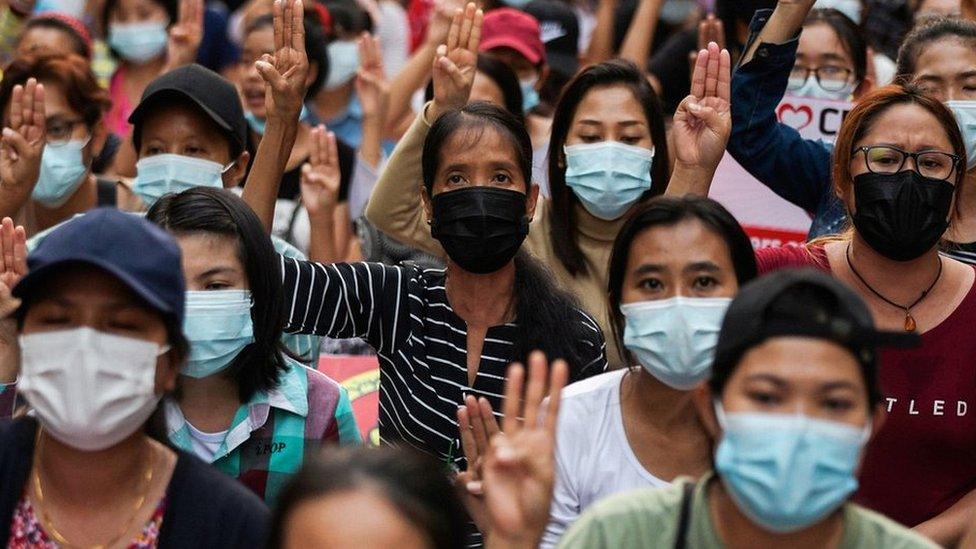Myanmar coup: Military blocks Facebook for sake of 'stability'
- Published
'Dark old days': What young Burmese fear about the Myanmar coup
Myanmar's military rulers have blocked access to Facebook, days after they overthrew the democratic government.
Officials said the social media platform - for many in Myanmar the main source of online information - would be blocked for the sake of "stability".
Facebook has become a key rallying point for opposition to Monday's coup.
In further civil disobedience, lawmakers are refusing to leave their compound in the capital, and more pot-banging was seen in Yangon.
The coup, led by armed forces chief Min Aung Hlaing, installed an 11-member junta, ending a short period of majority civilian rule.
The military said an election in November had been fraudulent - though the country's election commission said there was no evidence to back up such claims.
The elected civilian leader, Aung San Suu Kyi, along with President Win Myint, were detained and on Wednesday police filed charges against them.
The charges against her include possession of unlawful communication devices - walkie-talkies used by her security staff.
President Myint is accused of breaching Covid rules while campaigning for last November's election, which was won decisively by Ms Suu Kyi's National League for Democracy (NLD).
What is Facebook's role?
The Ministry of Communications and Information said access to Facebook would be blocked until 7 February. However, it was still reported to be accessible sporadically.
Anthony Aung, who runs a tour agency in Yangon, the main city, told the BBC at one point he still had access to the site through wifi but not cellular data.
He said "people around me are all rushing to download alternative apps and VPN" - virtual private networks, which allow users to get round internet restrictions.
Hours later, Mr Aung said Facebook had stopped working completely.
Yangon student Min Htet said her education had already been suspended due to the Covid pandemic. "Blocking Facebook today means that the freedom of young people is restricted from now on," she told Reuters.
Myanmar activists protest against military coup in Mandalay
Half of Myanmar's 54 million people use Facebook and activists have set up a page, external to co-ordinate opposition to the coup.
Facebook became popular in Myanmar - also known as Burma - as the company initially allowed its app to be used without data costs so that consumers could avoid paying expensive telecoms charges.
The social media giant acknowledged the disruption, saying "we urge authorities to restore connectivity so that people in Myanmar can communicate with their families and friends and access important information".
Telecoms company Telenor Myanmar, which is part of the Norwegian Telenor Group, said it would comply with the order to block Facebook, but suggested in a statement that this breached human rights law.
What is happening on the streets?
A small protest has taken place in front of a university in Myanmar's second city, Mandalay, with reports of four arrests.
In Yangon, residents banged cooking pots for a second night running.
A woman in the city told the BBC: "We bang drums as we want the military government and the world to know that we don't agree with this military coup... I want our leader Aung San Suu Kyi back."
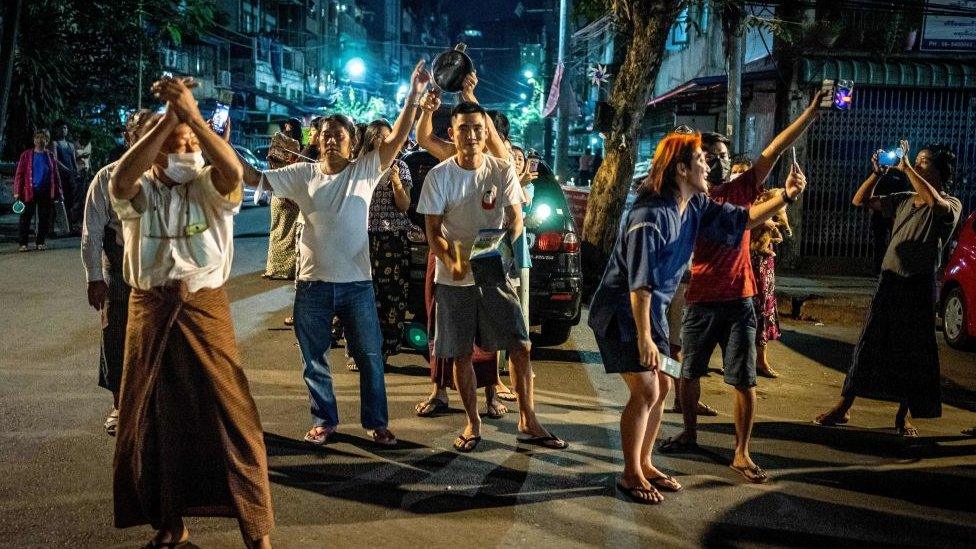
More protesters took to the streets in Yangon
At least 70 lawmakers with the NLD are refusing to leave a government guest house in the capital, Nay Pyi Taw, and have declared what they are calling a new parliamentary session, BBC Burmese reports.
The lawmakers are among hundreds who were confined by the military to guest houses before being told they were free to leave.
The streets are for the most part calm with no sign of major protest and a night-time curfew in force.
However, hospitals have seen protests. Many medics have either stopped work, or continued while wearing symbols of defiance.
But a rally by thousands in support of the military, known as the Tatmadaw, took place in Nay Pyi Taw. Some waved banners saying "Tatmadaw that loves people".
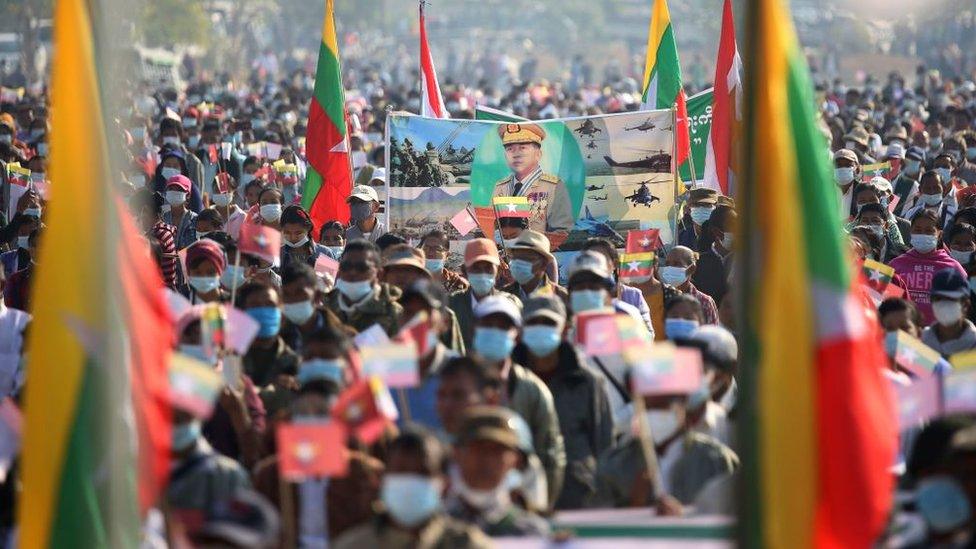
A rally took place in support of the military regime in the capital, Nay Pyi Taw
'Absolutely unacceptable'
UN Secretary General António Guterres has meanwhile called for constitutional order to be re-established in Myanmar.
"It's absolutely unacceptable to reverse the result of the elections and the will of the people," he said.
The Security Council adopted a resolution expressing "deep concern" and calling for the immediate release of Aung San Suu Kyi.
"The members of the Security Council emphasized the need for the continued support of the democratic transition in Myanmar," the 15-member council said in a statement agreed by consensus.
On Wednesday, the council failed to agree on a statement condemning the coup, after it was blocked by China, which - as one of five permanent members - has a veto.
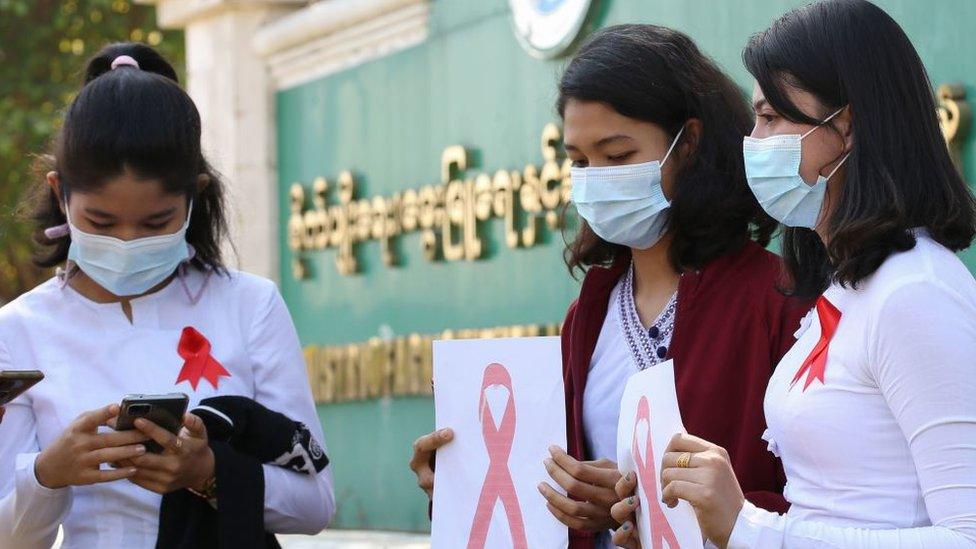
Department of Agriculture works wearing red ribbons in protest
Beijing has long played a role of protecting Myanmar from international scrutiny, and has warned since the coup that sanctions or international pressure would only make things worse.
Alongside Russia, it has repeatedly shielded Myanmar from criticism at the UN over the military crackdown on the Muslim minority Rohingya population.

Myanmar at a glance
Myanmar is a country of 54 million people in South East Asia which shares borders with Bangladesh, India, China, Thailand and Laos.
It was ruled by an oppressive military government from 1962 to 2011, leading to international condemnation and sanctions.
Aung San Suu Kyi spent years campaigning for democratic reforms. A gradual liberalisation began in 2010, though the military still retained considerable influence.
A government led by Ms Suu Kyi came to power after free elections in 2015. But a deadly military crackdown two years later on Rohingya Muslims sent hundreds of thousands fleeing to Bangladesh and triggered a rift between Ms Suu Kyi and the international community.
She has remained popular at home and her party won again by a landslide in the November 2020 election. But the military have now stepped in to take control once more.
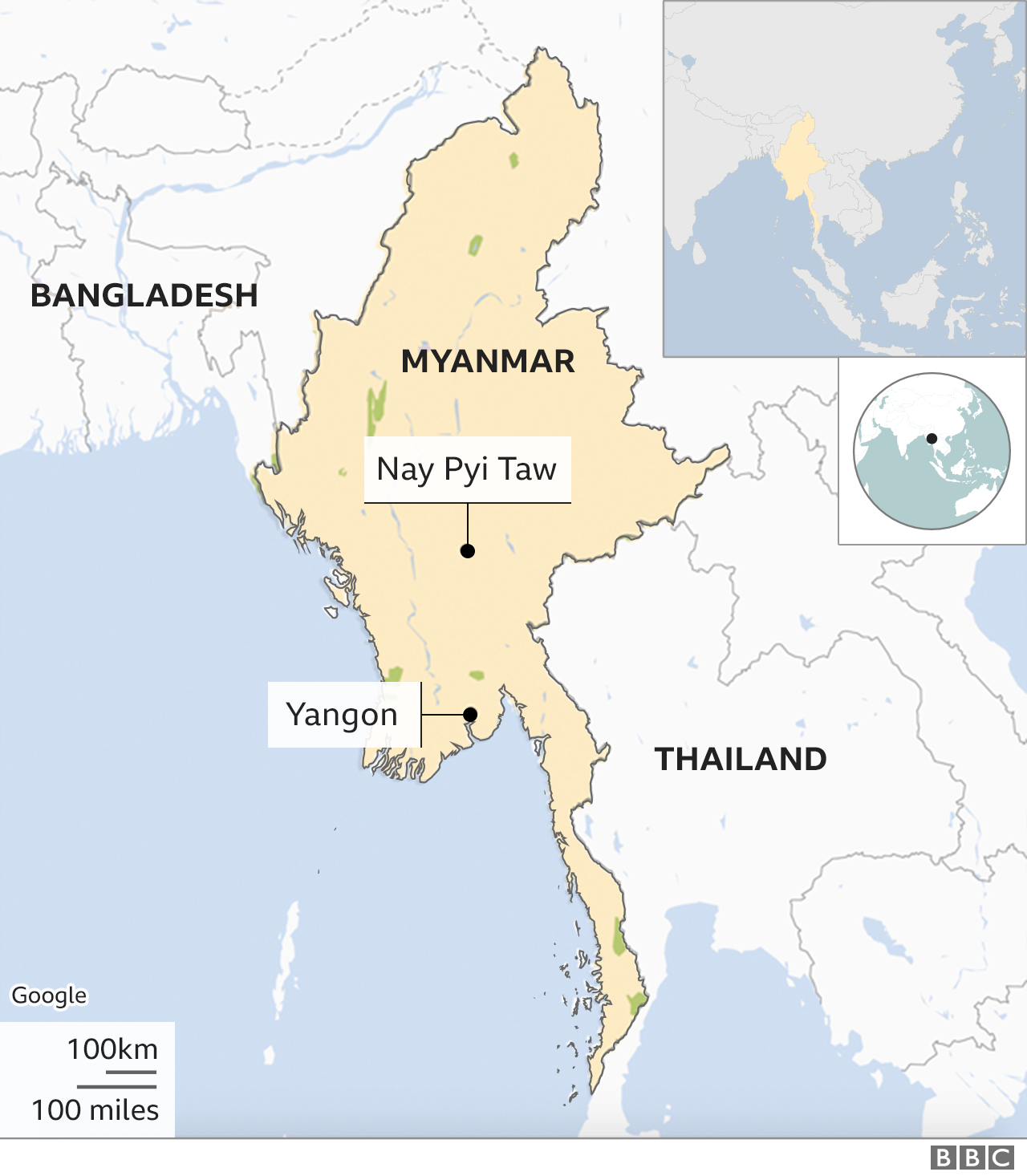


Have you been affected by recent events in Myanmar? You can share your experience by emailing haveyoursay@bbc.co.uk, external.
Please include a contact number if you are willing to speak to a BBC journalist. You can also get in touch in the following ways:
WhatsApp: +44 7756 165803
Tweet: @BBC_HaveYourSay, external
Please read our terms & conditions and privacy policy
If you are reading this page and can't see the form you will need to visit the mobile version of the BBC website to submit your question or comment or you can email us at HaveYourSay@bbc.co.uk, external. Please include your name, age and location with any submission.
Related topics
- Published2 February 2021
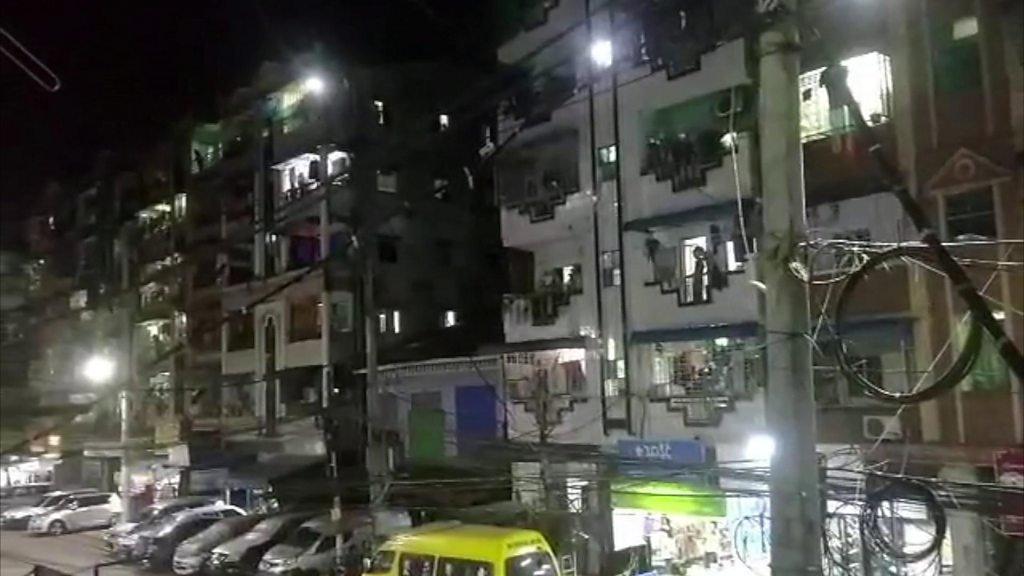
- Published25 July 2022
